- Homepage
- Our green home
- Beautiful Bouquets of Flowers
Beautiful bouquets of flowers
Beautiful bouquets of flowers oft come wrapped in single-use plastic; is there an alternative?
I have often wondered what a young woman thinks when she is given a bouquet of flowers wrapped in newsprint that one sees occasionally at the supermarket. The contrast between the beautiful blooms and the envelope is striking, making a statement. Most would consider it ugly.
Does she think that he’s cheap? He simply cannot afford a decent bouquet. Or is she contemplating that when she says “I do” she is always going to be getting second best? It is definitely time to start looking for someone who thinks more highly of her.
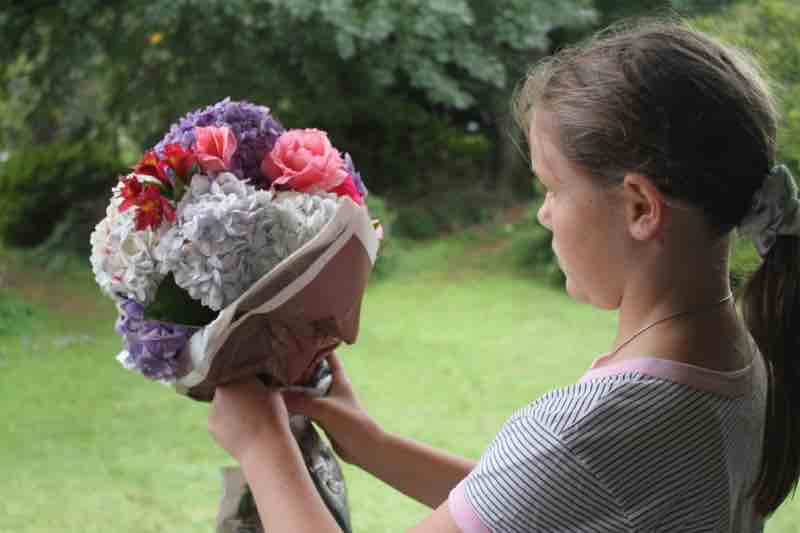
Or does she think he’s trying to save money so they will have their own home that much sooner? Dare she ask if he has opened a sinking-fund that the savings on the bouquet will go into? Warren Buffet would approve; that is how he started out in life[3].
Perhaps she is wondering if it reveals a real concern for the environment. Is it because he is worried about leaving behind a pristine world for the children they will bear?
A gift of flowers is without equal even if it lasts only for a few days; the scent of a rose, the beauty of a queen protea or even a bunch of poppies are all so special. Yet they come at a price.
Firstly the flowers are usually wrapped in pretty paper and then another of cellophane; numerous rubber bands hold the bouquet together. Inside will likely be tucked a little sachet of plant food in a single-use plastic bag. They all go to the New England Road dump, ripe for the next fire that will cover the city in a dense cloud of toxic fumes.
Those trimmings one suspects cost nearly as much as the flowers. Whether the seller passes on the savings for a bouquet wrapped in newspaper, I really wouldn’t know. I hope so.
Is it time for us to rethink our attitude to the flimsy jackets that not only flowers come in? Should we shun them in favour of bouquets and presents wrapped in newspaper? In fact the glossy adverts that come with the daily rag would be just fine to package them.
Give someone close to you a bunch of flowers today; just make sure it is not wrapped in plastic. Better still do some forest bathing; take a walk in the garden and pick out the blooms yourself.
I often boast that I must be the only man in the whole world who gets fresh roses every working day of the year in my office. Well sometimes they are poppies or another posy. I know how much I’m appreciated and valued.
Incidentally have you read Flowers for Mrs Harris and Love of a Rose? Those are two literary gems just as magnificent as any bouquet; they enthralled me.
Bees and flowers
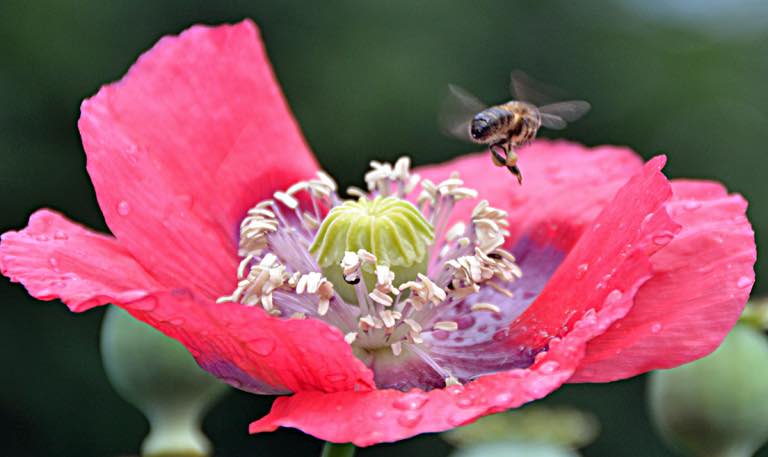
Every keeper loves flowers of course; without them there would be no honey. The good wife knows she has to pick early in the morning because before long there will be a frenzy of bees collecting pollen; the blooms soon look tatty.
Pollen and honey tell a story; they are the protein, fat and nectar that bees need for their wellbeing. And in fact they require these nutrients from different species of flowers; each provides its own unique phyto-nutrients. Insects living in a monoculture do not thrive like those exposed to many kinds of blooms.
Smart agriculture does not poison the wild blooms between fields of sunflowers, for example. In fact it encourages them; bees given a broad diet will proliferate and produce far more vigorous larvae with benefits for all.
If you are in fact considering having a hive or two in the garden then a beginners' beekeeping day is the place to start.
Beautiful bouquets of flowers are at their best with many different blooms.
So we too need many different salads, vegetables and fruits. Humans who enjoy seven or more variously coloured foods every day are far less likely to be visiting their doctors; they have a 33% lower all-cause of death.
Turmeric is one of our favourites; perhaps the most nutritious of all and especially for sores that won't heal.
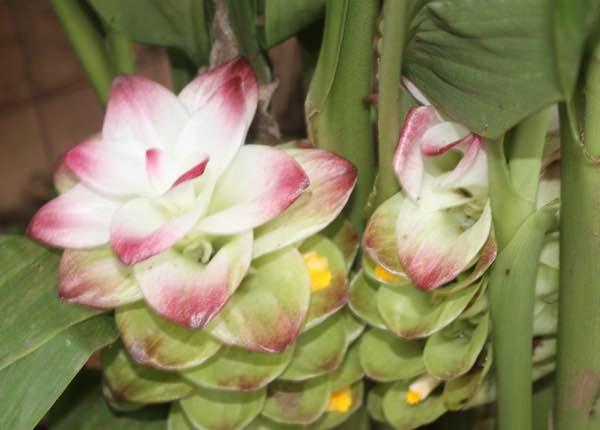
Grow many beautiful bouquets of flowers in your garden; some of them producing fresh food that you can enjoy. Your family too will bloom.
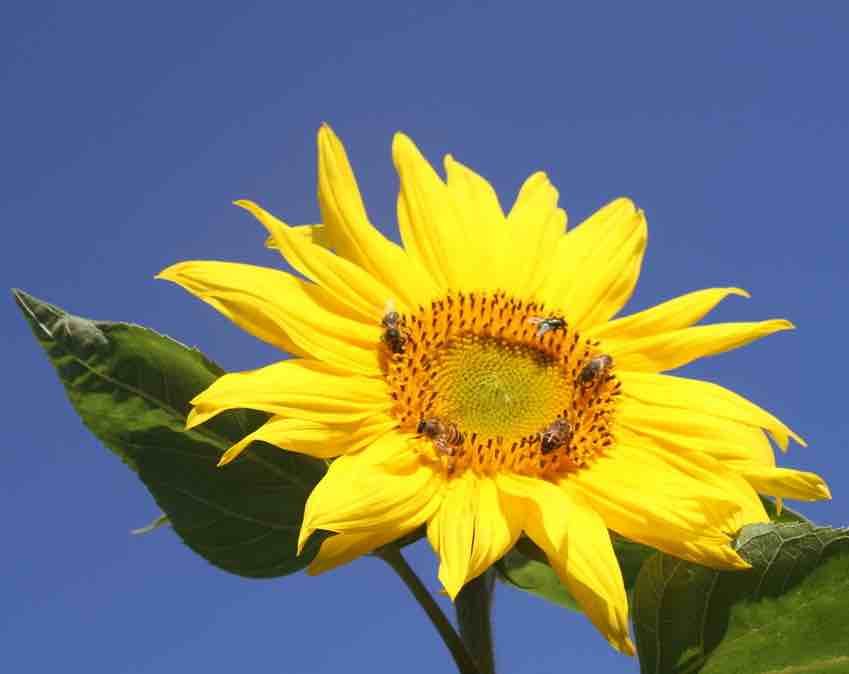
Beautiful bouquets of flowers
Beautiful bouquets of flowers wrapped in single-use plastic destined for the landfill will mean yet more misery for the planet; and those living on it.
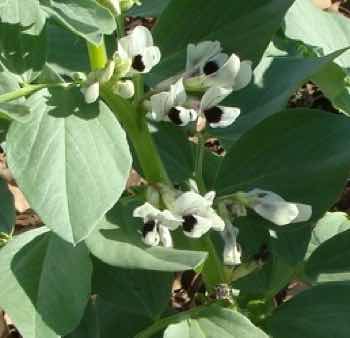
These beautiful broad bean flowers will produce a rich harvest for both the bees and the humans that eat the legumes. They are rich in plant protein and are one of very few sources of dopamine, the feel-good hormone.
Freezing broad beans means having plenty of protein and levodopa all year round. They also give protection against Parkinson's disease and age-related macular degeneration.
Growing beautiful bouquets of flowers in the garden is part of the Cyan Zone philosophy[2]; caring for both ourselves and the planet.
It's interesting that in all five of the Blue Zones of the world they grow and eat broad beans; longevity is the key word.
When browsing use right click and "Open Link in New Tab" or you may get a bad gateway signal.
The material expressed on this page is gleaned from the nutritional and environmental literature; it is clearly referenced. A plain distinction is made between the author's opinion and that which is scientifically proven. When in doubt consult your health professional.
To suggest a correction or clarification, write to Dr Bernard Preston here. Contact.
Newsletter
Our newsletter is entitled "create a cyan zone" at your home, preserving both yourself and Mother Earth for future generations; and the family too, of course. We promise not to spam you with daily emails promoting various products. You may get an occasional nudge to buy one of my books.
Here are the back issues.
- Lifestyle and ideal body weight
- What are ultra-processed foods?
- Investing in long-term health
- Diseases from plastic exposure
- Intensive lifestyle management for obesity has limited value
- A world largely devoid of Parkinson's Disease
- The impact of friendly bacteria in the tum on the prevention of cancer
- There's a hole in the bucket
- Everyone is talking about weight loss drugs
- Pull the sweet tooth
- If you suffer from heartburn plant a susu
- Refined maize meal and stunting
- Should agriculture and industry get priority for water and electricity?
- Nature is calling
- Mill your own flour
- Bake your own sourdough bread
- Microplastics from our water
- Alternative types of water storage
- Wear your clothes out
- Comfort foods
- Create a bee-friendly environment
- Go to bed slightly hungry
- Keep bees
- Blue zone folk are religious
- Reduce plastic waste
- Family is important
- What can go in compost?
- Grow broad beans for longevity
- Harvest and store sunshine
- Blue zone exercise
- Harvest and store your rainwater
- Create a cyan zone at your home
Did you find this page interesting? How about forwarding it to a friendly book or food junkie? Better still, a social media tick would help.
- Homepage
- Our green home
- Beautiful Bouquets of Flowers
Address:
56 Groenekloof Rd,
Hilton, KZN
South Africa
Website:
https://www.bernard-preston.com